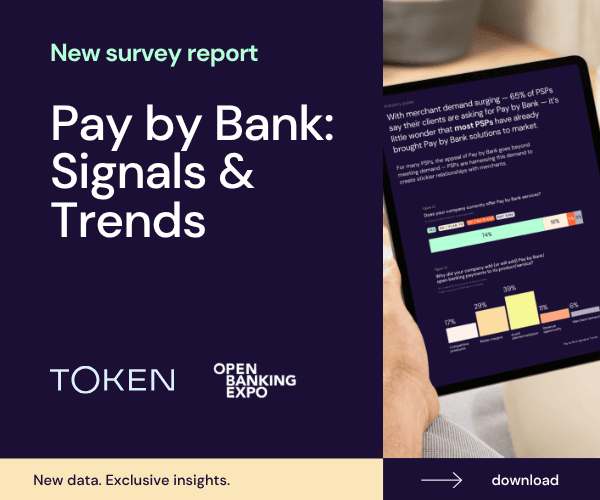

Blog: A day in the life of an attendee – key takeaways from OBExpo UK & Europe
Naomi Yikuno | Insights, UK, Women In Open Banking
04 Nov 2025
Open Banking Expo UK & Europe took place on 21-22 October, which concurrently showcased Open Finance, QUALCO Live, Smart Data, and Payments. Panels and debates by leading industry actors, academics, regulators, and fintechs discussed the current state of affairs and what is to come.
As a junior in the field, I was given the opportunity to attend the Expo as a first-timer: here were my key takeaways from recurring themes throughout the day.
Commercialisation of Open Banking and Smart Data
Turning Open Banking into a ubiquitous form of payment requires a shift from viewing Open Banking as merely a compliance mandate to building a robust, sustainable commercial market with incentives for all stakeholders.
Megan Coulson, UK public policy lead at TrueLayer spoke of clarifying the dividing line between “what you are compelled to do as a market participant and what you want to do commercially” in the first powerhouse debate of the event, ‘The roadmap to real impact: Progress, pressure points and 2026 vision’. This sentiment was later echoed by Luke Ryder, standards, strategic policy and public affairs director at Open Banking Limited, who emphasised that “mandates bring people to the table, and commercial incentives keep people there”.

Naomi Yikuno, trainee solicitor at A&O Shearman, attended Open Banking Expo UK & Europe for the first time this year
Andrew Self, head of Open Banking and Open Finance at the Financial Conduct Authority (FCA), outlined that there are no current plans to provide a formal source of compensation to banks for APIs. However, many banks have reaped commercial benefits from strategic investments into fintechs, as well as fintech partnerships.
For example Token.io, headline partner of the Expo, has partnered with HSBC since 2019 with a view to diversify the Open Banking offering at HSBC. Todd Clyde, chief executive officer of Token.io, expressed an encouraging projected growth of 13% year-on-year in UK A2A payments until 2030, materialising their shared ambition for A2A payments to become mainstream.
At the fireside chat ‘Behind the scenes: Making fintech-bank partnerships work’, Adam Betteridge, partnerships and Open Banking lead at TSB Bank, spoke of the fruitful partnerships with fintechs such as Datavillage in terms of commercial value and knowledge. In the continued drive towards commercialisation more partnerships are to be expected across the industry, acknowledged in the running theme of collaboration throughout the Expo. Huw Davies, co-founder and co-chief executive officer of Ozone API, astutely expressed: “If you want to get there fast, go alone. But if you want to go far, you need to go together.”
Commercial variable recurring payments (cVRP) have vast potential to provide commercial benefit to consumers, such as closing the present A2A functionality gap for use cases such as subscriptions. VRP also plays an important role in efforts for financial inclusion, as payment control is placed back into the hands of consumers. This can cater for a wider range of circumstances such as precarious pay.
The FCA’s Self displayed enthusiasm towards the industry efforts in rolling out cVRP and seeing benefits “realised quickly”, as 31 organisations have committed to funding the independent scheme operator for low risk VRPs.
Standardisation
Standardisation was a recurring theme in many different contexts: the standardisation of APIs and the wider infrastructure of Smart Data, the standardisation of customer experience when interacting with Open Banking and Open Finance, and standardisation of the consent processes. Uniformity of technical standards will be a central focus of the Future Entity.
Providing a standardised and consistent consent process was highlighted by Danh Nguyen, general counsel and director of legal and risk at Open Banking Limited, as a key way to build consumer trust in the powerhouse debate ‘Building the trust layer: Consent, control and confidence in Smart Data’. This will require the setting and observance of strong customer experience guidelines for Smart Data, akin to that of Open Banking. Uniform, safe-by-design standards will build the required trust and familiarity with Open Banking as a payment method.
Ana Abrão Carla Costa, chief executive officer of Open Finance Brasil, emphasised the need for consumers to know precisely what they are consenting to and when their data is being used outside of the financial ecosystem. This is of cardinal importance as a cross-sectoral Smart Data ecosystem emerges: spanning pensions, energy, mortgages and more.
Agentic AI
Many use cases of Open Finance which will generate the most value for consumers will only be made possible with the use of Agentic AI, providing read/write access to their financial data. Whilst the panel in the powerhouse debate ‘Open Finance 2030: Vision, value, and the road ahead’ displayed enthusiasm to new use cases such as making car payments, this was underpinned by caution – unsurprisingly from a regulatory perspective. Future-proofing the Payment Services Regulations will require provisions for liability in agentic commerce, and the monitoring of its use.
Overall, the success of Open Banking is not contingent on replacing existing forms of payment. A robust financial ecosystem has choice and competition. User adoption will increase as Open Banking becomes more ubiquitous, consumer trust increases, and attention is drawn to successful use cases.
Naomi Yikuno is a future trainee solicitor at A&O Shearman and a University of Bristol LLB Law Graduate, whose final year research project was ‘To What Extent Does Open Banking Resolve Issues of Financial Inclusion?’.



